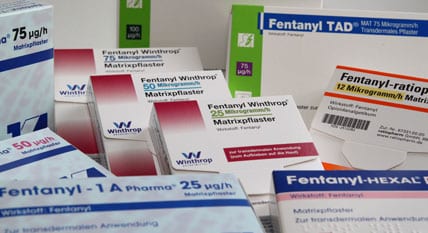At Stillman and Friedland, we keep ourselves informed on major trends which affect Tennesseans. We have written a number of posts on how to improve and speed healing while avoiding drug therapy. This is crucial, considering that opioid pain relievers are often “gateway” drugs to addiction and death. Addiction can happen when opioids are used as prescribed medications, or when they are taken by family or friends of the patient. When the prescription source is cut off or becomes too expensive, street drugs become the default option.
Deaths due to imported fentanyl are spiking in Tennessee, up 70% over last year, according to a Tennessean article published on Monday. Total fentanyl deaths in Tennessee were 1,776 last year, as fentanyl-caused deaths have continued to increase every year for the last six years. The 2017, U.S. death rate from overdoses was over 72,000, with two-thirds caused by fentanyl. Overall deaths in the U.S. in 2018 are conservatively predicted to be over 75,000.
Cheap and highly potent fentanyl is lethal in extremely small amounts. Fentanyl is produced in China and Mexico and smuggled into the U.S. It is cut into street drugs such as heroin and fake OxyContin pills, boosting their effects at a very low production cost. But the human cost is very high.
Overall, there are now more deaths in the U.S. from drugs than car accidents. Death toll figures do not reflect the wider picture of survived overdoses or the ruin of lives and families due to addiction.
This week Daily Wire podcast journalist Michael Knowles interviewed John Waters, COO of the Hudson Institute, on the alarming increase in drug deaths in the U.S. Walters, a former cabinet member of the Bush 43 administration, was responsible for shaping drug policy. Walters continues to monitor and to advise on the current drug crisis:
Walters contends that there are a number of factors in play that are creating a perfectly lethal storm of overdose deaths:
• We have a drug culture which makes drug experimentation and use socially acceptable.
• Doctors assumed that a now-discredited theory was correct—that patients in pain could use opiates and opioids without addiction becoming an issue, because the meds were “necessary”.
• Chinese and Mexican illegal exports of cheap fentanyl to the U.S. Fentanyl is a drug so potent and lethal that unevenly diluted fentanyl can result in batches with zero dosage for some pills and overdose death for a few others. It’s Russian roulette.
Fighting long-held cultural norms is an uphill battle, especially when the entertainment industry itself is steeped in drug culture. A quick internet search for rap lyrics about drugs yielded links to a long, alphabetized list of songs, as well as a 2016 Billboard post of “15 Best Songs About Drugs”. That is the extreme side of the glorification of doping.
Even outside the entertainment industry there is general acceptance that if something is wrong the solution is to take a pill. Americans take pills for aches and pains, various medical conditions and mood or mental disorders. This is the usual model of treating symptoms instead of root causes. Many individuals are opting to do their own research and get better with zero or minimal medications, but many in the medical profession still are on the pill track. In the area of pain relief, how many doctors prescribe pain meds instead of alternative and effective strategies? Our post about Dr. Sarno’s method for dealing with back pain covers this topic in detail.
Doctors now are more aware that opioids can be dangerous for patients, yet doctors still prescribe opioids beyond the immediate post-trauma period. Studies show that the long-term use of opioids is ineffective as pain treatment compared to ibuprofen or other OTC pain relievers, so there is no benefit to extended use of opioids. The side effects of pain relievers include susceptibility to pneumonia and other breathing disorders such as sleep apnea. Associated brain and liver damage along with digestive issues mean pain meds make you sicker, not better. More opioid prescriptions lead to a growing number of addicts. Patients who became addicts before the changes in guidelines are still out there, and unscrupulous doctors are still handing out prescriptions to addicts.
New, tighter controls over prescriptions have mostly led to the end of “doc shopping”—when addicts try to get multiple prescriptions for their growing habit. What this means is that they are turning to street drugs to get the same high. The main danger with street drugs is unreliability of dosage. For fentanyl this is a huge problem, leading to the jump in overdoses and overdose deaths. Because such small amounts are cut with fillers or other drugs, the challenge is to mix the fentanyl and base thoroughly. Remember that most of the street fentanyl is produced anonymously by criminals in China and Mexico. There is no accountability at all.
• A quantity in the amount of only a few salt grains is lethal; unevenly mixed fentanyl kills.
John Walters notes that offering “safe” drugs to addicts in government-controlled clinics would mean that drug users would be maintained by taxpayers as a dependent sub-class of the population. So how can we break this cycle and rehabilitate addicts? Yes, we need rehab programs, but Waters points out that when the supply is highly restricted we have fewer addicts. Cutting off supplies is difficult in the case of the growing fentanyl epidemic. A San Diego Union Tribune article reported this week that the USPS is a major gateway for small yet highly lucrative and lethal quantities of fentanyl:
A recent Senate investigation found another hurdle is the U.S. Postal Service’s failure to fully deploy a program to require more detailed sender and recipient information on packages — a tool that helps law enforcement target suspicious shipments…Private shippers such as UPS and FedEx, however, are required to include the information, apparently making the U.S. Postal Service a more attractive option for illicit shippers, the report found.
We need to close the loopholes and real holes which allow in these dangerous substances into the U.S. The more of these dangerous synthetic opioids there are on the street, the more people there will be with ruined and lost lives.
• As a first step, avoid using these drugs once you are out of the immediate post-surgery period following your accident.
• Since teens often get into their parents’ medicine cabinet, either don’t bring them into the house, or keep them securely locked away.
• Explore alternative treatments to improve your healing.
• Seek to influence government policy to solve this crisis, it is bigger than all of us.
Because we care…







